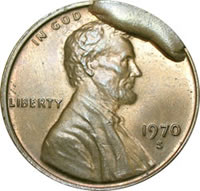

Not realizing this, critics – including Sarah Palin – denounced the supposed omission of the motto. During an appearance at a right-to-life fund-raiser in November 2009, Palin brought up the presidential dollars and seemed to imply that someone in Washington had made a deliberate effort to downplay the importance of “In God We Trust” in the coins’ design.
“Who calls a shot like that? Who makes a decision like that?” she asked rhetorically. “It’s a disturbing trend.”
It was widely believed that Palin assumed the “omission” had been made by the Obama Administration. But, in fact, the placement of the motto on the edge of the presidential dollars had been determined while George Bush was president.
Soon thereafter, the inscription was moved to a much more prominent location on the obverse of the coins.
Some presidential dollars have indeed been “God-less” because they were struck by error with plain edges. Ironically, these coins enjoy substantial premiums over normal examples.

In 1970, a different kind of error involving “In God We Trust” appeared on small numbers of Lincoln cents made at the San Francisco Mint. Part of the steel on one or more dies had broken off, causing metal to flow into the empty space this created on each coin when it was struck. As it happened, the resulting blob of metal – known to collectors as a “cud” – covered the words “We Trust” along the top edge of the obverse (or “heads” side) of each coin, leaving only “In God” visible.
These mint error coins came to be known as “atheist cents” and stirred considerable interest at the time. They’re not great rarities, but they’re scarce enough to be worth a modest premium even now.
The inclusion of “In God We Trust” on U.S. coins and paper money has long
been a point of contention with certain segments of the American populace. It
has been challenged in court a number of times as a violation of the
Establishment Clause of the U.S. Constitution’s First Amendment and of the
principle of separation of church and state.
Critics charge that the phrase constitutes “respect for an establishment of
religion” by the government. However, appeals courts have consistently held that
such traditional, patriotic or ceremonial words do not amount to government
sponsorship of a religious exercise or the establishment of a religion.
In all of these respects, it has been an important – and now indispensable – thread in the fabric of America’s national life.